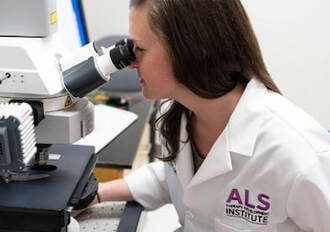ALS Research and Clinical Trials |
|
|
Researchers in the United States and around the world are working hard to figure out what causes ALS and how it affects the body so they can develop effective treatments and ultimately find a cure. They are studying the potential roles of gene mutations, environmental toxins, viruses, cell abnormalities, and much more.
|
|
Based on their findings, scientists develop and test compounds until they find a potential drug promising enough to test on people living with ALS.
ALS Clinical Trials
|
Clinical trials are multiphase research studies that explore new treatments with volunteers who fit certain criteria. There are always active clinical trials looking for participants who have been diagnosed with ALS. ALS clinical trials continue to produce breakthroughs that move the needle closer to finding a cure.
|
|
Participating in a clinical trial is entirely up to you. Some people volunteer with the hope of getting a new treatment not yet available to the public that will slow progression, but keep in mind that trying an experimental drug can expose you to side effects and other risks. There is also the possibility that you will receive a placebo instead of the actual drug.
ALS Neurologist InterviewLyle Ostrow, MD, PhD sees patients, conducts research, and collaborates with the ALS community. In this wide-ranging interview, Dr. Ostrow discusses clinical trials, biomarkers, and how people living with ALS can contribute to research. See interview
|
|
Before enrolling in any trial, always talk with your ALS neurologist. Ask questions to find out what each trial entails. You can learn more and search for clinical trials on the following websites:
|
ClinicalTrials.gov is a database of privately and publicly funded clinical studies where you can search for active ALS clinical trials around the world, read about specific studies, and contact investigators to learn more.
|
|
ALS Therapy Development Institute (ALS TDI) is the largest drug discovery lab in the world focused solely on curing ALS. By sharing your data with this nonprofit biotech, you can help advance research and gain access to your own data on disease progression. Learn more about ALS TDI's Precision Medicine Program.
|
|
The Northeast ALS Consortium (NEALS) is an academic research consortium that translates scientific advances into clinical research and new treatments at member medical institutions across the U.S. You can help improve the ALS research process by applying to become an ALS Research Ambassador.
|
|
The ALS Signal Dashboard is a search tool developed by I AM ALS that provides an overview of ALS treatments and studies, including some observational studies on familial ALS. You can search by location, drug/treatment, trial phase, and genetic target.
|
|
The ALS Association is the largest private funder of ALS research worldwide. Its research funding tripled after the Ice Bucket Challenge in 2014. The ALS Association partners with academia, industry, government, and other nonprofit organizations to develop long-lasting collaborations among researchers.
|
|
The Muscular Dystrophy Association has supported research on neuromuscular diseases, including ALS, for over 70 years. Every year MDA supports hundreds of physicians and scientists in the fight to develop effective treatments. It also funds research conferences, training grants, and career development grants.
|
ALS Clinical Trial Video SeriesIf you would like to learn more about clinical trials, you can watch the following videos from ALS TDI’s three-part ALS Town Hall series:
- Part 1: Understanding ALS Clinical Trials - Part 2: What is it like to participate in a trial? - Part 3: Current ALS Clinical Trials |
Other ways you can help advance ALS research
|
The National ALS Registry is a database operated by the CDC that collects information from volunteers with ALS to help scientists learn more about the disease so they can develop treatments and find a cure. You can help make a difference by filling out a short survey. The information you submit goes into a secure database and will only be displayed as group information.
To help advance ALS research, you can also:
|
Expanded Access Programs
|
People living with ALS often can’t participate in clinical trials because of strict eligibility requirements or travel limitations. Expanded Access Programs (EAPs) offer an additional pathway to trying experimental therapies that have not yet been proven or authorized by the U.S. Food and Drug Administration (FDA).
|
|
EAPs can offer hope and access to potential treatments that show promise, though there is no guarantee that these therapies will be effective or have no side effects.
EAPs for ALS are still not very common, and there can be multiple hurdles to participating. You must seek approval from your neurologist, who then must request the drug from the manufacturer. Neither your neurologist nor the manufacturer is obligated to participate. Some neurologists may feel uncomfortable with EAPs or not have experience with them. The ACT for ALS bill, passed by the U.S. Congress in December 2021, should increase funding and access for EAPs for ALS in the coming years.
To find an EAP, you can talk with your neurologist, contact drug manufacturers, or visit the NEALS webpage on Expanded Access. The FDA website goes into more detail about the EAP process.
EAPs for ALS are still not very common, and there can be multiple hurdles to participating. You must seek approval from your neurologist, who then must request the drug from the manufacturer. Neither your neurologist nor the manufacturer is obligated to participate. Some neurologists may feel uncomfortable with EAPs or not have experience with them. The ACT for ALS bill, passed by the U.S. Congress in December 2021, should increase funding and access for EAPs for ALS in the coming years.
To find an EAP, you can talk with your neurologist, contact drug manufacturers, or visit the NEALS webpage on Expanded Access. The FDA website goes into more detail about the EAP process.











